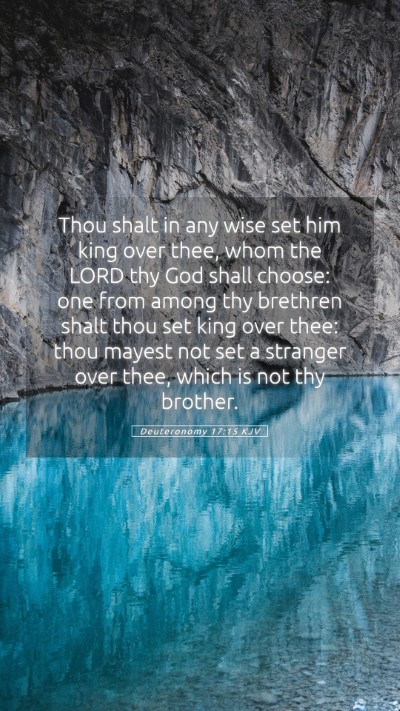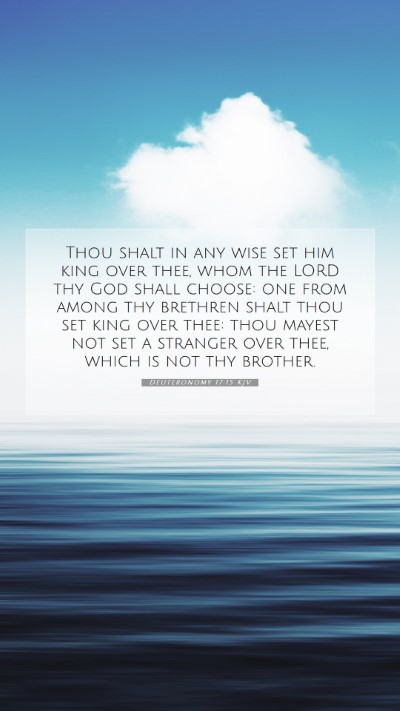Understanding Deuteronomy 17:15 - A Comprehensive Bible Verse Interpretation
The verse Deuteronomy 17:15 states: "Thou shalt in any wise set him king over thee, whom the Lord thy God shall choose: one from among thy brethren shalt thou set king over thee; thou mayest not set a stranger over thee, which is not thy brother." This verse deals with the selection of a king for the Israelites and provides foundational insights for understanding the principles of leadership, governance, and divine appointment.
Key Themes and Insights
- Divine Selection: The verse emphasizes the importance of divine choice in leadership. It suggests that the King is not merely a political position but one ordained by God.
- Community and Brotherhood: The requirement for the king to be from among the Israelites underscores the importance of shared identity and values in leadership, reflecting the principles of kinship and community.
- Rejection of Foreign Rule: The directive to avoid a foreigner as king speaks to the dangers of external influence on Israel’s identity and moral compass. It highlights a strong sense of nationalism and the need for leaders to share the same spiritual and cultural heritage as their people.
Bible Verse Meaning According to Public Domain Commentaries
Matthew Henry's Commentary
According to Matthew Henry, this verse provides profound insight into how the Israelites were to view the leadership among them. He notes that the people were to choose a leader endowed with wisdom and reverence for God, rather than leaving such a significant decision to chance or the whims of powerful outsiders. This shows a commitment to divine governance as a core principle in the selection of leaders.
Albert Barnes' Commentary
Albert Barnes elaborates on the necessity of choosing a king from among their brethren. He emphasizes that this requirement was intended to safeguard the nation from the corrupt influences of foreign powers. Barnes also highlights that this stipulation reinforces the necessity for leaders to maintain ties with the populace, ensuring that they are aware of and responsive to the common good and the unique needs of the Israelite community.
Adam Clarke's Commentary
Adam Clarke expounds on the implications of selecting a king with the right qualifications. He points out the essential characteristics a ruler should possess and the societal implications of having a king who is not only chosen by God but also shares the heritage of the people. Clarke places particular emphasis on the moral and ethical responsibilities attributed to such leaders as God's chosen representatives among their people.
Application and Significance
Understanding this verse and its commentaries encourages readers to reflect on the significance of leadership within their communities and the criteria upon which they select those in authority. It prompts consideration of how divine principles should inform leadership qualities in contemporary settings, emphasizing integrity, community connection, and spiritual alignment as vital attributes.
Cross References
- 1 Samuel 8:5 - The demand for a king.
- 1 Samuel 10:24 - The anointing of Saul as king.
- Psalm 78:70-72 - God's choice of David as shepherd for His people.
Further Study and Resources
For those interested in deeper exploration, there are numerous Bible study tools and Bible study guides available that can assist in understanding this and other similar passages. Engaging in online Bible study can also provide valuable context and community discussion surrounding the interpretation of this verse.
Conclusion
In conclusion, Deuteronomy 17:15 is not merely a historical directive but a scripture rich with theological implications regarding the nature of leadership and divine authority. By investigating the meanings and interpretations from respected commentaries, one can gain a deeper understanding of how this passage applies to both ancient Israel and contemporary society's approach to governance and community leadership.


